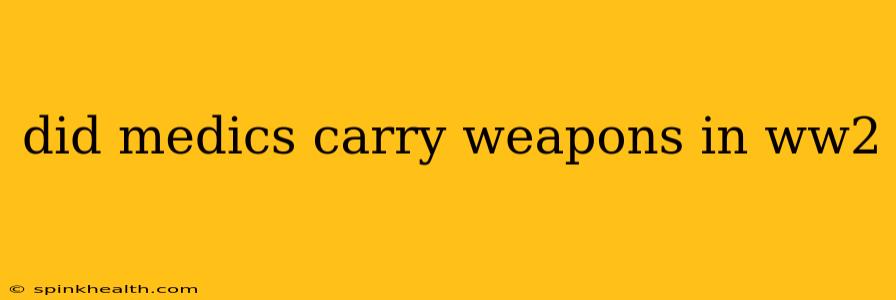The question of whether medics carried weapons in WWII isn't a simple yes or no. The reality is far more nuanced, varying significantly depending on the specific military branch, the theater of war, and even the individual medic's circumstances. Let's delve into the complexities of this fascinating historical topic.
My grandfather, a medic in the US Army during the European theater, often recounted stories of his time. He’d tell of the intense pressure of tending to wounded soldiers under constant enemy fire, the heart-wrenching choices he had to make, and the ever-present fear for his own life. He carried a pistol, not for offensive action, but for self-defense. This wasn't uncommon, particularly for medics in front-line units.
Why Medics Sometimes Carried Weapons
While the Geneva Conventions protected medical personnel, the reality on the ground often differed drastically from the ideal. Many medics found themselves in incredibly dangerous situations, far removed from the safety of established aid stations. Carrying a weapon wasn't about aggression; it was about survival.
Protecting Themselves and Their Patients:
This is the primary reason medics often opted to carry a sidearm. Imagine this: you're a medic tending to a wounded soldier in a foxhole under intense enemy fire. You're a vulnerable target, and your ability to help your patients is directly tied to your own safety. A pistol, even a small one, could deter an enemy from attacking or provide a means of defense as a last resort.
Retrieving the Wounded:
Often, medics had to venture into dangerous areas to retrieve wounded soldiers. A weapon gave them a degree of protection during these perilous missions, enabling them to reach those in need.
Maintaining Order:
In chaotic battlefield situations, having a weapon could help a medic maintain some level of order and control, ensuring the safety of both themselves and the wounded.
Why Medics Sometimes Didn't Carry Weapons
Conversely, many medics, especially those in less exposed roles or those following strict adherence to the Geneva Conventions, chose not to carry weapons. The risk of being mistaken for a combatant and becoming a target themselves was a real concern. The Geneva Conventions, while often violated, were still powerful symbols, and carrying weapons could undermine their protection.
What Kinds of Weapons Did They Carry?
The types of weapons varied based on availability and personal preference. Pistols were the most common choice, largely due to their ease of concealment and use. Some medics might carry a rifle or submachine gun, especially if integrated into combat units, but this was less frequent. The focus was always on medical care; weapons were purely defensive tools.
Did the Rules Change Throughout the War?
There weren't explicit policy changes regarding weapons for medics during the war. However, the evolving realities on the ground frequently meant that individual medics made their own decisions based on perceived risk. This is a key point to understand when considering this question.
Were There Differences Between Armies?
The policies and practices surrounding weapons for medics differed between armies and nations. Some armies might have provided their medics with weapons more readily than others, and individual units might have had their own informal policies that guided this practice. This highlights the critical role of context in understanding this complex topic.
Conclusion
The issue of whether medics carried weapons in WWII is a complex one with no easy answer. While the Geneva Conventions aimed to protect medical personnel, the brutal realities of war often forced medics to make difficult choices for their own safety and the safety of their patients. Many carried weapons for self-defense, understanding the importance of their own survival in order to save the lives of others. Their decisions were driven by the desperate circumstances they found themselves in, highlighting the often-unseen human cost of war.

